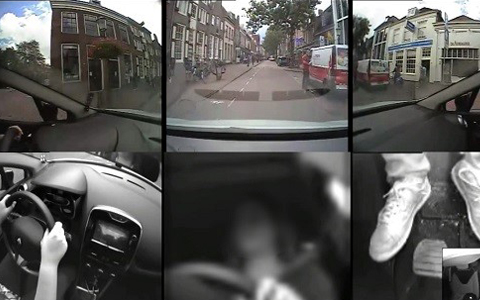All natural driving study hits the road
Background
Project: UDRIVE
Texting while you drive? Don’t. Really. Distraction is a leading cause of accidents, but of course it isn’t the only one. A large-scale, EU-funded study will be looking over the shoulder of motorists and scooter riders in six countries for at least one year in a bid to map a route towards safer, more sustainable road traffic. Recommendations from this project are expected in 2017.

The Udrive project is collecting data from 200 vehicles (lorries, cars and scooters), keeping track of the actions and reactions of the participating motorists as they engage with everyday traffic. “Our objective is to gain insight into real, ‘natural’ driving behaviour,” says project coordinator Nicole van Nes of the Dutch national institute for road safety research (SWOV).
Natural driving behaviour, she explains, differs significantly from that displayed in contrived situations or on simulators. “It’s not influenced by an experimental or laboratory setting, where you ask drivers to do something specific, like using a particular type of equipment or taking a specific route,” she notes. “In a naturalistic study, the participants’ own vehicles are instrumented to capture the necessary data, and they drive them as usual.”
Dashboard diaries
UDRIVE began in October 2012 and is due to deliver its conclusions in June 2017. It is Europe’s largest naturalistic driving study to date, designed to generate new knowledge about crash causation factors and associated risks, distraction and inattention, and drivers’/riders’ interaction with vulnerable road users such as pedestrians and cyclists. In addition to these three road safety topics, the UDRIVE team is exploring eco-driving aspects as a possible contribution to greater sustainability.
Individual vehicles will be observed over the course of 1.5 years. However, a lot of preparation was required before the data collection could actually begin. “We had to design a dedicated data acquisition system,” van Nes explains. “We also had to figure out how to manage the data, and how to protect it in order to preserve the drivers’ privacy.”
These technical developments have been completed, participants have been recruited, and their vehicles have been equipped. In total, 120 cars, 40 trucks and 40 scooters are involved, van Nes reports. Some 250 drivers will be participating in the study, as many of these vehicles are used by several people.
Eyes on the road!
“Our data acquisition system is truly unique,” says van Nes. It is based on unobtrusive cameras — seven in total for every car; eight for the trucks — that are running while the vehicle is in use. “This really gives us a good look at what’s happening in and around the vehicle,” she notes. “In addition, we have a smart camera inside the cars and trucks, which automatically identifies other objects in the vicinity — this includes other vehicles, but also cyclists and pedestrians.”
Information from the study vehicles has now begun to roll in. “We are very excited,” van Nes notes with the air of keen anticipation others might display when opening a Christmas gift. “After two years of preparatory work, we now have access to actual data,” she says, announcing that the analysis of this data is about to start.
It will involve pinpointing and dissecting safety-critical events and disasters narrowly averted — as well as any crashes in which the vehicles might have been involved, although luckily few of those are likely. Based on their findings, the UDRIVE team then intends to suggest possible risk mitigation measures. They will also strive to highlight topics for further research.
In formulating their recommendations, the researchers will consider a wide array of options, says van Nes, pointing to examples as varied as policy measures and awareness campaigns, infrastructure adaptations and changes in vehicle design. “If we can identify where drivers fail, we can think of ways to offer them support,” she concludes.
This innovation was made possible by Israel’s continued participation in the official Horizon 2020 fund, managed in Israel by ISERD part of The Israel Innovation Authority (Formerly the Office of the Chief Scientist and MATIMOP). The initiative has taken Israeli R&D to the next level with the help of ground-breaking collaboration between scientists in Israel and Europe, as well as essential funding and support.
Project details
Project acronym: UDRIVE
Participants: Netherlands (Coordinator), Austria, Belgium, Czech Republic, France, Germany, Israel, Poland, Spain, Sweden, United Kingdom
Project Reference N° 314050
Total cost: € 10 696 865
EU contribution: € 7 999 965
Duration: 1 October 2012 — 30 June 2017
